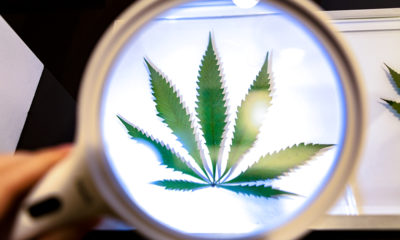
Medical
Florida’s Medical Marijuana Chief Steps Down Amid Controversy
After three years of mounting discontent from patients and providers alike, Florida’s medical marijuana chief Christian Bax is stepping down. He leaves office as state health authorities prepare for a tsunami of applications for a few highly coveted marijuana licenses.
In a resignation letter to Florida’s Department of Health, dated July 27, Christian Bax, the embattled director of the state’s medical marijuana program, said he “will be leaving no later than August 10.”
Bax had been the target of growing criticism by both patients and what media accounts call the “ganjapreneurs” seeking a foothold in the state’s tightly restricted medical marijuana market. Filling Bax’s shoes will be his deputy director, Courtney Coppola, who has worked for what is now called the state Office of Medical Marijuana Use (OMMU) since just after Bax began his tenure in 2015.
Exemplifying the discontent, John Morgan, a key figure behind the 2016 Amendment 2 initiative that launched the medical marijuana program, was quoted by the Orlando Weekly saying of Bax: “He was so inept that it had to be intentional. Anyone would be better and more capable.”
Bureaucratic Bottlenecking
Karen Goldstein, the executive director of NORML of Florida, told Cannabis Now that the state has seen “bureaucratic chaos” under Bax’s leadership. Bax’s office (which has gone through a few name changes) was actually created in 2015, after the Florida legislature passed a “CBD-specific” law allowing the use of low-THC medical marijuana products. Goldstein said the law was “created to confuse the voters,” and derail pressure for a more expansive program. If so, it didn’t work, as Amendment 2 was passed by more than 70 percent the following year. As Goldstein proudly notes, that’s a better margin than Gov. Rick Scott got — either when he was elected in 2010 or re-elected in 2014.
Bax, an attorney by trade, “had no medical knowledge or experience with marijuana” when he was appointed as head of the new office, Goldstein charges.
But Goldstein sees his appointment has a symptom of a wider official bottlenecking of the program. Licensing for growers has not kept pace with the protocols established by the enabling legislation for Amendment 2 — which was itself passed by the state house amid activist protest in 2017. The “vertical system” created by that law inherently favors big businesses, in Goldstein’s view. The grower is also to be processor and dispenser, and each such entity can have up to 25 dispensaries. These entities are known as Medical Marijuana Treatment Centers (MMTCs), and there are now 14 of them — the largest being Trulieve.
The announcement of Bax’s resignation comes days after the Health Department granted an MMTC license to the previously denied Nature’s Way Nursery of Miami, following an opinion by an administrative law judge that the method the OMMU was using to screen applicants was flawed.
Under Health Department mandate in response to the opinion, one of the new licenses must also go to an African American farmer who was part of the Pigford class action suit, in which the U.S. Department of Agriculture was accused of discrimination against black farmers. The Pigford case ended in a settlement in 2010. Florida created a “Pigford class” of MMTC license following protests by the Florida Black Farmers and Agriculturalists Association, which was one of the litigants in the Pigford case.
There are also what Goldstein characterizes as onerous restrictions on patients — including the mandate that they must have a three-month relationship with a doctor to even apply for a card.
“No such restriction exists for anyone seeking harmful opioids or any other pharmaceutical drug,” Goldstein points out. “And then it was taking months even after you apply — three, four, five months. People were calling me asking for help, saying, ‘I can’t get my medicine, I don’t know what to do.'”
Also, just before Bax’s announcement, the state house approved $13.3 million in funding for the OMMU, after lawmakers had threatened to hold up the funds in response to the delays, as the Tampa Bay Times reported.
Goldstein states flatly that the OMMU under Bax “was obstructing the implementation of the program.”
“For instance, there are still no rules for edibles, despite edibles being specifically mentioned in Senate Bill 8A, the implementing law for the 2016 initiative,” Goldstein says.
Then there is the controversy about patient access to actual smokable herbaceous cannabis. Under current regulations, you can only buy “whole-flower” cannabis pre-packed in devices designed for vaping. Goldstein says this is violating the will of Florida voters. “Amendment 2 says you can’t smoke in public, which implies that you can smoke in private.”
Among those fighting in the state courts for the right to herbaceous cannabis and home cultivation is Joe Redner, a Tampa cancer patient who credits his survival to juicing fresh cannabis leaves.
“The state is obstructing the medical marijuana program any way they possibly can,” Goldstein sums up. “We’re hoping that Christian Bax leaving the office will be a step in the right direction. But time will tell.”
The Next Step: Legalization
Goldstein is also the vice chair of Regulate Florida, which is working to get a legalization initiative on the ballot for 2020 — under the slogan “Regulate Cannabis Like Alcohol.” To do that, they need to get nearly 8000,000 signatures, with some from each electoral district in the state, in just two years.
“When we passed medical marijuana, we had four years [to get the signatures], but Rick Scott changed it to two years,” Goldstein notes.
She sees a general legalization as assisting medical patients. Under her proposal, adults in a single household would be able to grow six mature plants.
“If a particular strain is helpful but not available in dispensaries, they’ll be able to grow it at home,” Goldstein says. “And a lot of people don’t want to be in a registry, they don’t want a public record that they are users.”
Under the “regulated adult use” proposal, anyone with proof of age could legally buy at retail outlets. Goldstein believes it would also undercut the black market and cut down on underage access.
She points to the massive algae bloom now choking the life out of Lake Okeechobee — mostly due to fertilizer runoff from sugar-cane agriculture — as one of many problems that a taxed cannabis sector could help address. “Tax revenue from a legal marijuana industry could help clean up that lake,” she says.
TELL US, do you have access to medical cannabis?























